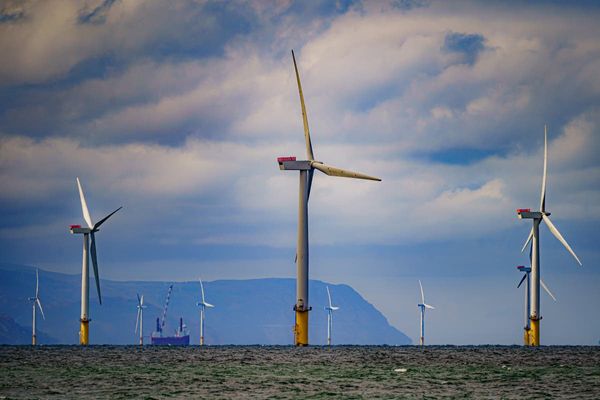
Peace may have broken out between Labour and its union backers over workers’ rights, but shadow ministers face fierce lobbying in another key policy area: how to make the switch from fossil fuels without causing deep economic scarring.
Unions representing tens of thousands of oil and gas workers – in particular GMB and Unite – are demanding urgent answers about what will happen to members’ jobs as the UK switches to cleaner energy sources.
When Labour dropped its £28bn green spending pledge earlier this year, it stuck to the promise of generating all the UK’s energy from green sources by 2030, saying it would create 400,000 jobs in the process.
But unions with a significant presence in oil and gas are concerned that the gap between that aspiration and the taxpayer funding Labour is willing to make available could leave their members high and dry.
The GMB has made no secret of its scepticism about Labour’s plan to ban new North Sea oil and gas licences. The general secretary, Gary Smith, last year called the plan “naive”, blaming “a lack of intellectual rigour”.
With Labour deemed highly unlikely to change course, however, discussions have shifted more recently to how the party could use industrial policy to create new jobs in the north-east of Scotland, where the oil and gas workforce is concentrated – and support those who end up out of work. Unions are desperate to avoid a repeat of the abrupt closure of the UK’s coalmining industry, and have demanded a “just transition”.
On Friday, the Unite leader, Sharon Graham, kicked off a provocative new poster campaign aimed squarely at Labour, with the slogan No Ban Without a Plan. In other words, the party should either reverse course on new North Sea licences, or show how it would protect the jobs and communities affected by the sector’s decline.
“What I’m trying to say to Labour is, ‘Look, don’t let go of one rope until you’ve got hold of another,’” Graham said. “There is a way for you to transition these workers, where you could be the heroes of the hour. Why wouldn’t you want to do that?”
Unite wants to see Labour commit to public investment of £6bn in offshore wind over six years, which it says would help create new employment for workers made redundant from declining fields.
The GMB has recently stuck to private conversations, including through an energy working group set up by Labour, rather than public lobbying – but its message is similar. A spokesperson said: “The GMB has been clear that we need an industrial plan for the UK’s transition, not just to fight for the jobs and skills we desperately need, but to help create stability and confidence that UK plc is worth investing in.”
Many in the union movement have long memories, recalling the deep scars left by the decline of mining, textiles and other labour-intensive industries through the 1980s and beyond. They also express concern that jobs in industries such as offshore wind tend to be less unionised and have worse terms and conditions than the oil and gas ones they are replacing. That worry is echoed in the US, where unions are battling to organise in the electric vehicle sector, with manufacturers such as Elon Musk’s Tesla highly resistant to unionisation.
Tessa Khan is the director of Uplift, a campaign group calling for a “rapid and fair” transition away from North Sea drilling. She has no sympathy for the idea of granting new licences for exploration. “From a climate perspective, all of this stuff needs to stay in the ground,” she said.
But Khan does share some of the unions’ worries about the consequences for communities in Scotland. According to industry estimates cited by Uplift, 200,000 jobs are directly or indirectly supported by the sector. With the fields already in long-term decline, that is two-thirds of the figure of a decade ago. “What’s needed is really concerted industrial policy and crucially an approach that involves the trade unions, the communities, local governments in Scotland, the Scottish government,” she said.
Offshore Energy UK, the industry body, is working with the Scottish government on a skills passport to enable workers to move between oil and gas jobs, and ones working with clean energy. OEUK said its members were poised to bring £200bn of investment into the sector over the next decade, if the government created “an attractive investment environment and a strong industrial economy”.
But Uplift is sceptical about the existing North Sea transition deal between the industry and government, warning that it does not do enough to create new jobs.
Labour insists it has answers to all the unions’ concerns. Ed Miliband, the shadow minister for energy security and net zero, has promised to create a state-owned power company, Great British Energy, headquartered in Scotland and capitalised with £8bn of taxpayers’ money. Of that, £5bn is earmarked for clean power, including offshore wind, where both sides agree that former oil workers have relevant skills.
In addition, Labour’s national wealth fund, to be backed with £7bn, will invest in carbon capture and storage, and upgrading ports, to create the infrastructure necessary for a significant increase in offshore generation.
However, while these are among the costliest spending pledges Labour has made, some environmentalists share the unions’ disquiet about whether they will be sufficient.
“It’s going to be quite a challenge for Labour in power,” said Chaitanya Kumar, head of environment and green transition for the New Economics Foundation (NEF) thinktank. He said a Labour government should also try to make private sector investment work better for UK jobs and workers, through the power of “disciplining capital” – using public money to extract conditions from companies, as the Biden administration has done in the US on a vast scale with the Inflation Reduction Act (IRA).
Labour has made some gestures in this direction, promising extra support through the energy pricing system, known as contracts for difference, to firms that create good jobs in the UK. Kumar said NEF would like to see it go much further. “That’s what we see in the US – huge amounts of tax credits, in the billions. That’s a lot of public money going into private hands, ultimately, but it’s coming with conditions.”
One area where it is unlikely there will be any meeting of minds is on the role of hydrogen in the UK’s future energy mix.
The GMB is pressing for Labour to keep open the possibility of a switch from gas to green hydrogen for domestic heating – something that experts including the Climate Change Committee believe is unlikely to be practical.
Representing thousands of gas heating engineers, the GMB fears that the wholesale switch to heat pumps – which most environmentalists believe is the most viable approach to decarbonising household heating – would mean fewer and lower-paid jobs. Labour has not publicly ruled out the use of green hydrogen for domestic heating, but like most experts, believes its main role will be in industry and transport. Party insiders see the GMB’s stance on this issue as unhelpful.
Aside from the role of hydrogen, Labour is adamant it can assuage the concerns of its union supporters over the risks facing workers as the economy is radically restructured to meet the challenge of the climate emergency.
But the battle over the future of the North Sea underlines the challenges Labour will face in government in confronting the climate emergency while keeping a tight rein on the public finances.










